Centrifugal pumps play a critical role in pharmaceutical manufacturing, enabling precise handling of liquids ranging from active pharmaceutical ingredients (APIs) to solvents and water for injection. These pumps ensure smooth, contamination-free fluid transfer while meeting strict hygiene and regulatory standards.
The global pharmaceutical pumps market, valued at USD 9.63 billion in 2022, is projected to grow to USD 11.2 billion by 2030, reflecting increasing demand for reliable, sanitary pumps in drug production, biotech processes, and sterile operations.
This guide highlights the centrifugal pump for the pharmaceutical industry applications, their types, and why they are essential for efficiency, safety, and compliance in pharmaceutical manufacturing.
Key Takeaways
- Centrifugal pumps convert rotational energy into pressure to move fluids efficiently, providing continuous, pulsation-free flow.
- Applications of centrifugal pump for the pharmaceutical industry span from raw material handling to sterile formulation, filling, and clean-in-place (CIP) systems.
- Pump types include single-stage, multistage, sanitary, and magnetic drive pumps, chosen based on fluid properties and process requirements.
- Material selection, flow rate, pressure, and operating conditions guide proper pump selection.
- Properly applied centrifugal pumps improve process reliability, maintain hygiene compliance, and reduce operational costs.
Role of Centrifugal Pump for the Pharmaceutical Industry
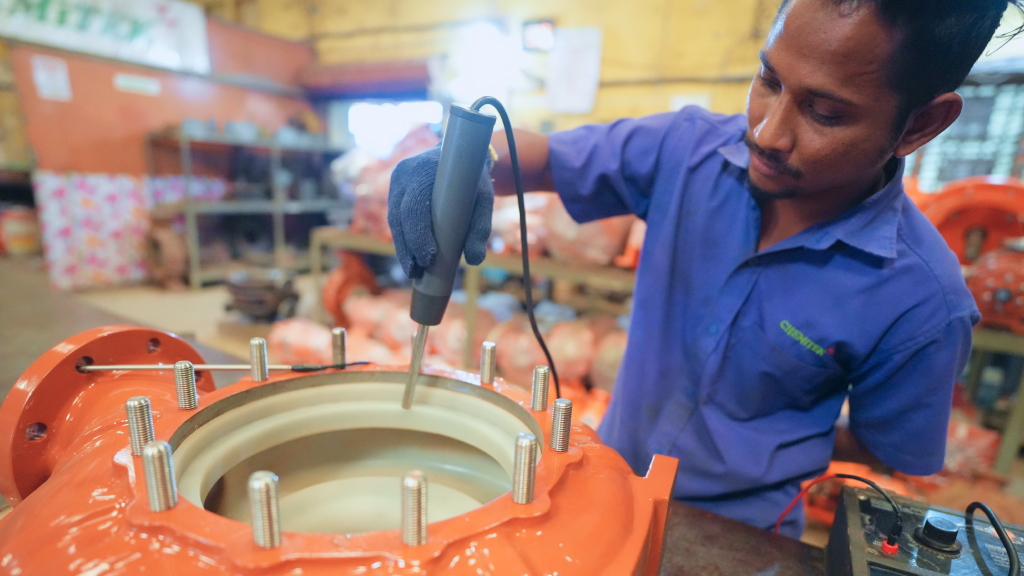
Centrifugal pumps use a rotating impeller to accelerate liquid and convert kinetic energy into pressure. In pharmaceutical operations, they ensure contamination-free, precise, and consistent fluid transfer, supporting process integrity, quality assurance, and regulatory compliance.
To understand their role, it’s important to look at the key benefits centrifugal pump for the pharmaceutical industry processes:
- Sanitary and hygienic designs prevent contamination in sterile processes.
- Smooth, pulsation-free flow ensures precise dosing and formulation accuracy.
- Low maintenance requirements due to simple construction with fewer moving parts.
- Resistant to wear and corrosion when handling solvents, acids, and APIs.
- Reliable performance in controlled environments such as cleanrooms or sterile facilities.
Types of Centrifugal Pump for the Pharmaceutical Industry
Different pharmaceutical processes require different pump designs for optimal performance. Here’s a closer look at the main types of centrifugal pumps used in the industry:
Application of Centrifugal Pump for the Pharmaceutical Industry
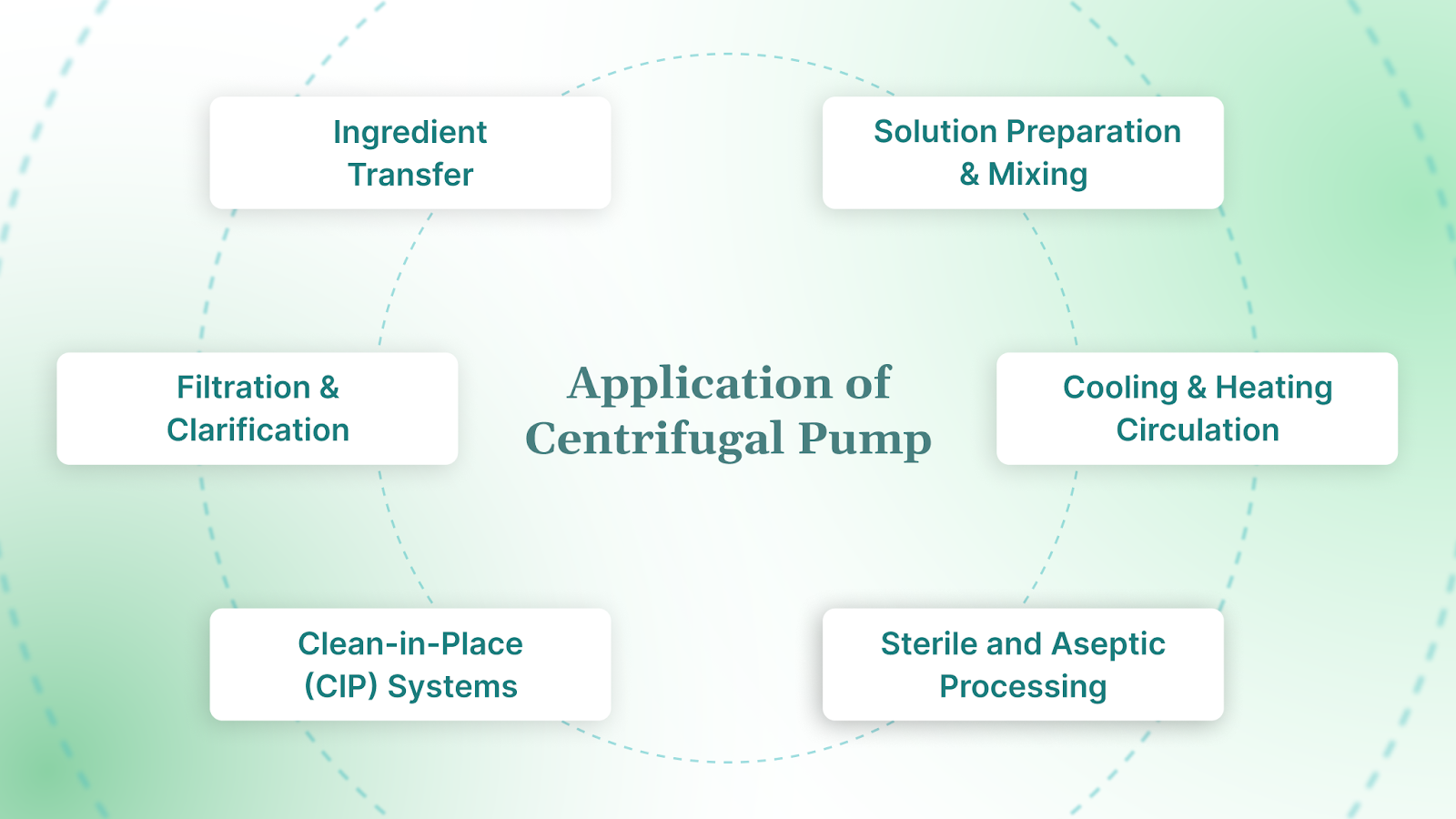
In pharmaceutical manufacturing, precision, sterility, and compliance are critical. Even minor equipment inefficiencies can affect product quality, regulatory adherence, and production schedules. Centrifugal pumps play a vital role in maintaining consistent fluid handling, ensuring sterile conditions, and supporting uninterrupted operations.
Here’s a detailed overview of key applications of centrifugal pump for the pharmaceutical industry processes:
1. Ingredient Transfer
Centrifugal pumps are extensively used to transfer raw liquids like water, oils, solvents, and active pharmaceutical ingredients (APIs) between storage tanks and processing units.
- Their low-shear operation ensures that sensitive compounds, such as proteins or suspensions, are not damaged during transfer.
- Operating pressures generally range from 1 to 6 bar, which allows smooth, continuous flow without introducing air bubbles or foam.
- They handle a wide range of viscosities, making them versatile for different pharmaceutical liquids.
Example: In injectable manufacturing, centrifugal pumps move APIs from bulk storage tanks to the mixing vessels without compromising stability.
2. Solution Preparation & Mixing
During formulation, centrifugal pumps are used to circulate liquids and ensure uniform mixing of ingredients.
- They prevent sedimentation of powders and suspensions, ensuring consistent product quality.
- Controlled flow maintains accurate concentration of active ingredients in solutions.
- Their ability to provide steady circulation is critical for reactions or dissolution processes that are sensitive to flow fluctuations.
Example: Oral syrups are mixed using centrifugal pumps to ensure the sweeteners, APIs, and solvents are evenly distributed without settling.
3. Filtration & Clarification
Centrifugal pumps support filtration by pushing liquids through filters or membranes gently.
- Steady flow ensures effective removal of impurities or particulate matter.
- Low shear prevents foaming or degradation of sensitive compounds, especially biologics.
- They can handle viscous or delicate solutions while maintaining filtration efficiency.
Example: Sterile filtration of vaccines or antibiotics prior to filling to remove microorganisms and ensure purity.
4. Cooling & Heating Circulation
Temperature control is critical in pharmaceutical processes such as fermentation, crystallization, or chemical reactions.
- Centrifugal pumps circulate heat transfer fluids like water, glycol, or steam condensates through jackets or heat exchangers.
- Even flow ensures uniform heating or cooling across reactors or storage tanks.
- Prevents hot or cold spots which can impact reaction rates or product stability.
Example: During fermentation for antibiotic production, pumps circulate coolant to maintain optimal temperature for microbial growth.
5. Clean-in-Place (CIP) Systems
CIP systems rely on centrifugal pumps to circulate cleaning and sanitizing solutions efficiently.
- Pumps provide consistent pressure and flow without disassembly of production lines, ensuring effective cleaning.
- Ensures compliance with Good Manufacturing Practices (GMP) and sterility standards.
- Reduces downtime since equipment does not need manual cleaning between batches.
Example: Cleaning of stainless steel reactors and piping in tablet manufacturing to prevent cross-contamination between batches.
6. Sterile and Aseptic Processing
Sanitary centrifugal pumps are designed for handling sterile fluids in aseptic environments.
- Smooth, polished surfaces prevent bacterial growth and contamination.
- Pumps comply with FDA and GMP standards, critical for injectable or biologic products.
- They allow gentle handling of sensitive APIs, preventing degradation during transfer or processing.
Example: Aseptic filling of vaccines where sterile solutions are pumped into vials without exposure to contaminants.
After reviewing these applications, attention must turn to proper pump selection, maintenance, and material compatibility to ensure consistent performance and regulatory compliance in pharmaceutical manufacturing.
How To Select the Right Centrifugal Pump for the Pharmaceutical Industry?
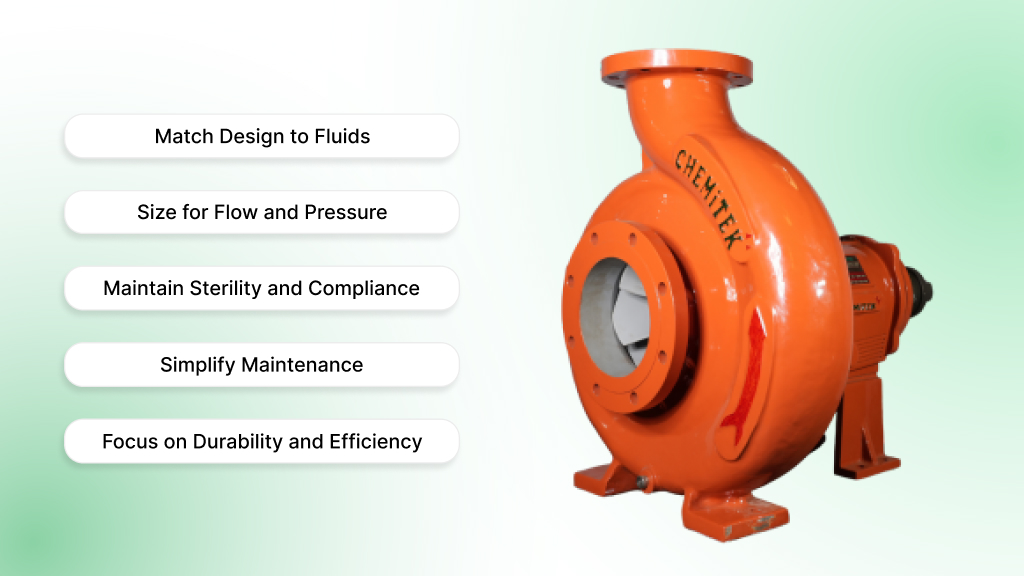
The efficiency, sterility, and safety of pharmaceutical manufacturing depend heavily on selecting the right centrifugal pump. Choosing a pump is more than matching technical specifications, it requires assessing how it will perform in sensitive pharmaceutical processes.
Here’s what to consider when choosing the right pump for :
- Match Design to Fluids: Use FDA-approved stainless steel (SS316/316L), PTFE-lined alloys, or hygienic materials for sterile, high-purity, or aggressive liquids. Ensure compatibility with CIP/SIP cleaning.
- Size for Flow and Pressure: Select pump capacity, impeller, and stage design to meet flow and pressure needs while operating near the best efficiency point (BEP) and avoiding cavitation.
- Maintain Sterility and Compliance: Opt for polished surfaces, sanitary seals, and seal-less or magnetic-drive designs to prevent contamination during processing and cleaning.
- Simplify Maintenance: Choose modular pumps for easy seal, bearing, and impeller replacement, and standardize models to reduce downtime.
- Focus on Durability and Efficiency: Pick corrosion-resistant, low-vibration, energy-efficient pumps to extend service life and ensure reliable, long-term operation.
Is your pharmaceutical production facing delays or contamination risks due to improper pump selection? Expert advice and purpose-built centrifugal pump solutions can improve efficiency, maintain sterility, and support regulatory compliance.
Chemitek: Centrifugal Pumps for Pharmaceutical Industry
At Chemitek Process Equipment Pvt. Ltd., we provide centrifugal pumps tailored for pharmaceutical applications. Our solutions support sterile fluid transfer, accurate dosing, and high-purity handling with stainless steel, PTFE-lined, and magnetic drive designs.
We handle pump selection, system integration, installation, and preventive maintenance to ensure reliable, compliant, and efficient pharmaceutical operations.
Contact us today to find the ideal centrifugal pump solution for your pharmaceutical manufacturing needs.
FAQs
1. Where are centrifugal pumps used in pharmaceutical manufacturing?
Centrifugal pumps are essential for moving fluids at various stages of pharmaceutical production. They are commonly used for transferring raw materials, handling sterile fluids, supporting Clean-in-Place (CIP) and Sterilize-in-Place (SIP) systems, blending formulations, filling operations, and managing process waste.
2. Can they handle corrosive or high-purity liquids?
Yes. Specialized designs, such as sanitary pumps and magnetic drive pumps, allow safe, leak-free handling of corrosive chemicals and high-purity fluids, protecting both the product and the environment.
3. How do they maintain sterility in pharmaceutical processes?
Centrifugal pumps maintain sterility through smooth, hygienic surfaces, seal-less or sanitary construction, and full compatibility with CIP and SIP procedures, which prevent microbial contamination during processing.
4. Which materials are commonly used?
Materials resistant to corrosion and contamination are standard. These include stainless steel grades like SS316 and SS316L, PTFE-lined alloys, and other hygienic, FDA-approved materials suitable for pharmaceutical applications.
5. How often should pharmaceutical centrifugal pumps be maintained?
Regular maintenance is critical. Weekly inspections, combined with scheduled servicing of seals, bearings, and impellers, ensure the pumps operate reliably and maintain product integrity over time.
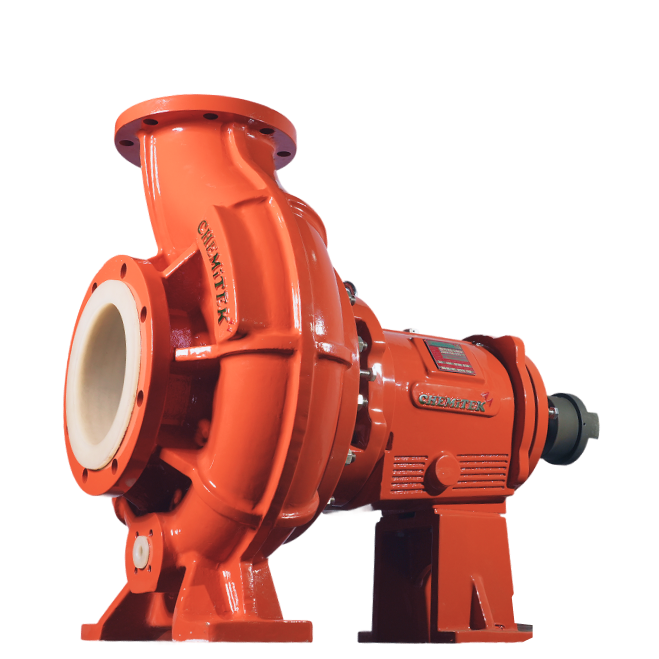
Latest posts
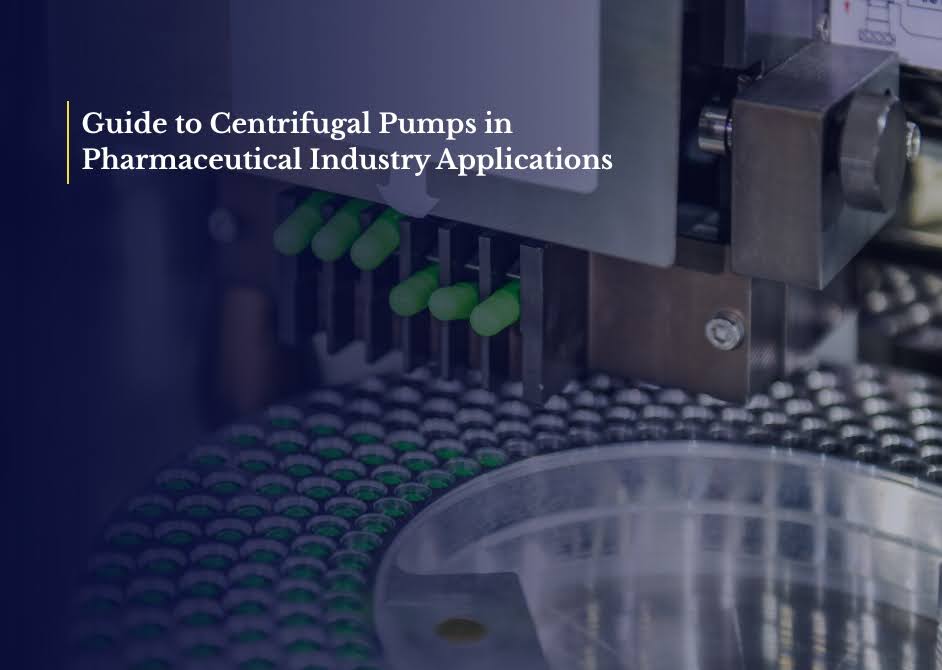
Guide to Centrifugal Pumps in Pharmaceutical Industry Applications
Ready to Upgrade Your Process Operations?